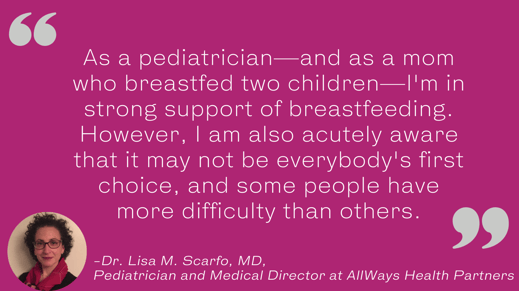Why exclusive breastfeeding doesn't work for every mom
Last week we shared the health benefits and challenges of breastfeeding with input from Deputy Chief Medical Officer Dr. Farah Shafi, MD. This week we're discussing when a provider might recommend both breastfeeding and formula—plus added insight from Pediatrician and Medical Director at AllWays Health Partners, Dr. Lisa M. Scarfo, MD. Whether you're a provider, parent, or family member of a new parent—continue reading to learn more.
Supplementing breast milk with formula
"Breastfeeding can be a challenge and can be very difficult for some moms, especially alongside sleeplessness and the stress of caring for a newborn," said Lisa Scarfo, MD, Pediatrician and Medical Director at AllWays Health Partners. There's a rapid drop in hormones after a woman has a baby that increases their chance of experiencing postpartum blues, even if they don't have a risk for depression. If there's difficulty with breastfeeding, it can be even more emotionally triggering. Babies can lose up to 10% of their body weight in their first few days of life, and this can cause stress to the mom and caregivers. During this period, newborns must be seen regularly by their primary care provider. The baby's provider monitors their growth on the infantile growth chart to ensure they gain a certain amount of weight per day. If the baby's birth weight goes below a certain threshold within the first week, there is concern that the baby isn't getting enough calories through breast milk. In that case, a provider might recommend that the baby is supplemented with formula in addition to breast milk for a short time—to ensure the baby doesn't become dehydrated or lose more weight.
Dr. Scarfo added, "As a pediatrician—and as a mom who breastfed two children—I'm in strong support of breastfeeding. However, I am also acutely aware that it may not be everybody's first choice, and some people have more difficulty than others. For moms who are struggling with breastfeeding and choose formula, know that your mental health is most critical to your child's well-being."

Providers should do everything to support mom's choice
Another reason mom may not be able to breastfeed is because of a surgical procedure that prevents sufficient milk production—or a complication or illness that happened during or after delivery. Mom could also be taking a medication that is not recommended for breastfeeding moms and cannot be avoided. As much as Lisa promotes and helps support breastfeeding, she affirmed what's most important is that moms make the right choice for their families and that providers should do everything they can to support those choices. The first few weeks of being a new mom are an emotional rollercoaster for women, and feeding choices for their newborn should not be a source that causes more distress.
In addition, some children have severe allergies to different kinds of milk proteins that are in mom's breast milk. These proteins come from everything mom is consuming in her diet. If a baby has severe vomiting, bloody diarrhea, or not gaining weight, this may indicate that the baby is not tolerating breast milk. A pediatrician might recommend trying an elimination diet. For example, if you think the baby might be sensitive to cow's milk proteins, you might ask the mom to restrict all intake of dairy products. If that doesn't work, the mom may have to try a hypoallergenic or elemental formula formulated for babies with these severe types of reactions.
To learn more, read "Learn more about breastfeeding preparation & introducing solid foods."
